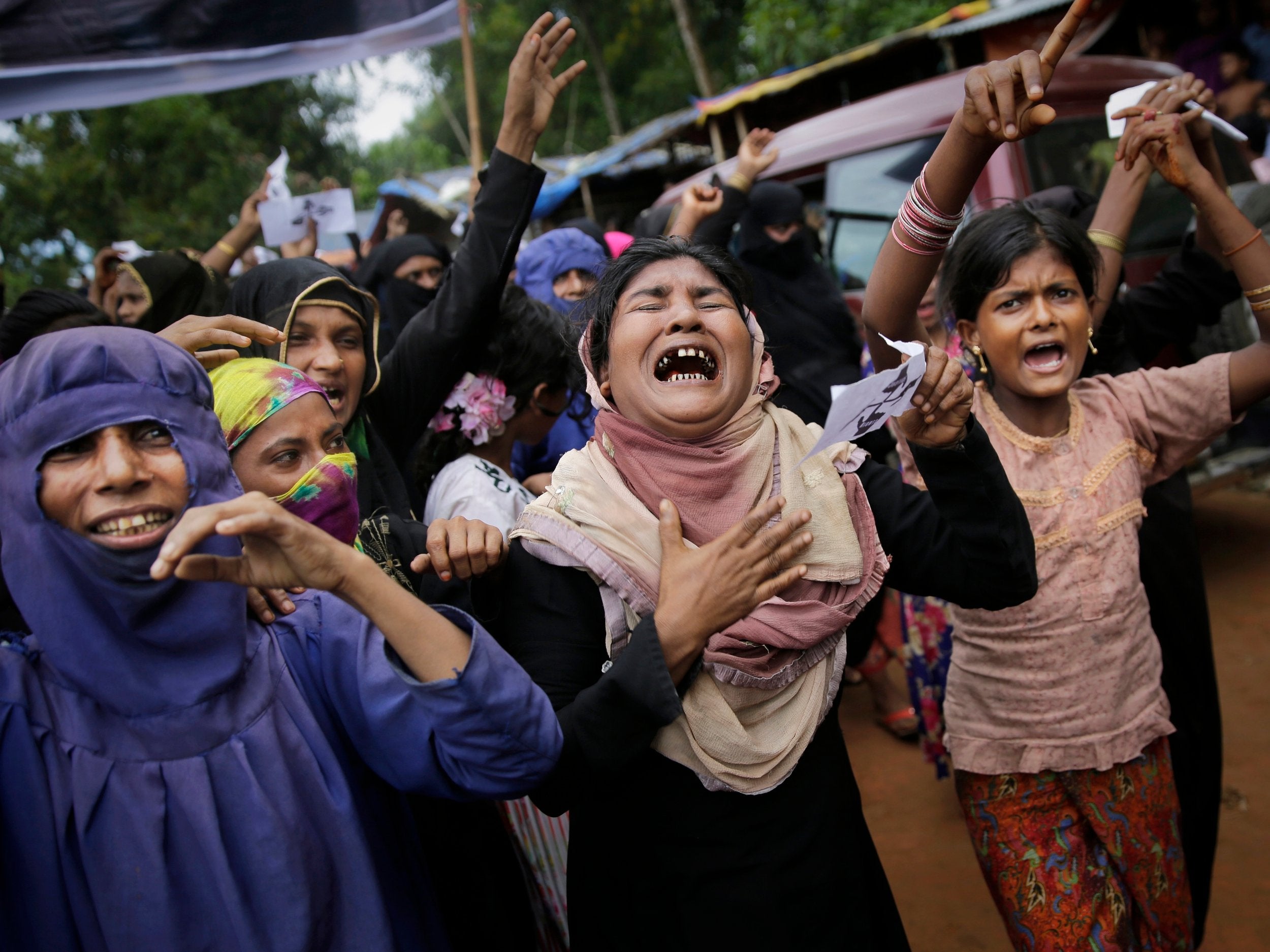Rohingya: UN calls for Myanmar generals to be prosecuted for genocide, war crimes and crimes against humanity
It is by far the strongest condemnation yet from the international community

Your support helps us to tell the story
From reproductive rights to climate change to Big Tech, The Independent is on the ground when the story is developing. Whether it's investigating the financials of Elon Musk's pro-Trump PAC or producing our latest documentary, 'The A Word', which shines a light on the American women fighting for reproductive rights, we know how important it is to parse out the facts from the messaging.
At such a critical moment in US history, we need reporters on the ground. Your donation allows us to keep sending journalists to speak to both sides of the story.
The Independent is trusted by Americans across the entire political spectrum. And unlike many other quality news outlets, we choose not to lock Americans out of our reporting and analysis with paywalls. We believe quality journalism should be available to everyone, paid for by those who can afford it.
Your support makes all the difference.UN investigators have for the first time declared the violence against Rohingya Muslims in northern Myanmar to be a campaign of genocide.
In a damning final report from their fact-finding mission, observers said Myanmar’s commander-in-chief and five other named generals should face prosecution for acting with “genocidal intent”, crimes against humanity and war crimes.
It is by far the strongest condemnation yet from the international community for a widespread military crackdown by the authorities in Rakhine state, which began on 25 August last year. The army said it had been responding to violent attacks by a Rohingya Muslim militant group.
But hundreds of Rohingya in exile spoke to the UN’s fact-finding team, working under the mandate of the Human Rights Council, to describe the burning of entire villages, gang rape of women and mass extrajudicial killings of civilians.
The violence sparked the exodus of more than 700,000 Rohingya to neighbouring Bangladesh, where they have been given shelter and support by the government and NGOs but still lack basic rights and citizenship.
Marzuki Darusman, chairman of the investigative team, said Myanmar’s military commander Min Aung Hlaing should step down in the wake of the report.
“The only way forward is to call for his resignation and stepping down immediately,” he told a news conference in Geneva.
In its report, which also relied on satellite footage and other corroborating information, the UN team cited a “conservative” estimate that some 10,000 people were killed in the violence.
Myanmar’s government refused the UN’s team access to the affected region, and the report released on Monday decried a lack of cooperation or even response from the government, which received an early copy of the report.
In dismissing the Myanmar army’s justification for the crackdown, it read: “Military necessity would never justify killing indiscriminately, gang raping women, assaulting children, and burning entire villages. The Tatmadaw’s [the military’s] tactics are consistently and grossly disproportionate to actual security threats, especially in Rakhine state, but also in northern Myanmar.
“They are shocking for the level of denial, normalcy and impunity that is attached to them. The Tatmadaw’s contempt for human life, integrity and freedom, and for international law generally, should be a cause of concern for the entire population.”
The investigators said the situation in Myanmar should be referred to the International Criminal Court, and if not, to a special tribunal. Myanmar is not a treaty member of the ICC – but it is one of the 47 member states of the Human Rights Council, meaning Monday’s report will carry greater weight than any that have come previously.
In naming six generals as prime candidates for prosecution at the ICC, the UN’s report admits that the civilian government in Myanmar has little power to control the country’s military.
Nonetheless, it includes damning words for the civilian government of Nobel Peace Prize laureate and Oxford graduate Aung San Suu Kyi, saying that “through their acts and omissions, the civilian authorities have contributed to the commission of atrocity crimes”.
“State Counsellor Suu Kyi has not used her de facto position as head of government, nor her moral authority, to stem or prevent the unfolding events in Rakhine State,” it says.
The report does not suggest that the crisis, which began a year ago, was a surprise – rather, it refers to a “catastrophe looming for decades” as a result of the “severe, systemic and institutionalised oppression from birth to death” of the Rohingya people.
The UN mission found the violence of August 2017 was underpinned by numerous examples of hate speech and incitement, including when in November 2012 a leading Rakhine political party cited Hitler, arguing that “inhuman acts” were sometimes necessary to “maintain a race”.
The UN’s human rights agency said the report relied on 875 in-depth interviews with victims and eyewitnesses as well as satellite imagery and authenticated documents, photographs and videos. The team will next present a fuller report, with analysis of the next possible legal steps, to the Human Rights Council on 18 September.
Mark Field, the UK foreign office minister, said he welcomed the UN mission’s work and said Britain believes “the gravity of the report warrants the attention of both the UN Human Rights Council and the UN Security Council”.
And Michael McGrath of Save the Children, one of the leading charities working to support Rohingya refugees, said it was time “[for] the UN Security Council to refer Myanmar to the International Criminal Court without delay”.
He said: “The international community needs to send a firm signal to all perpetrators, including the Myanmar military, that crimes of this magnitude will not be allowed to pass unaccounted for.”
Join our commenting forum
Join thought-provoking conversations, follow other Independent readers and see their replies
Comments